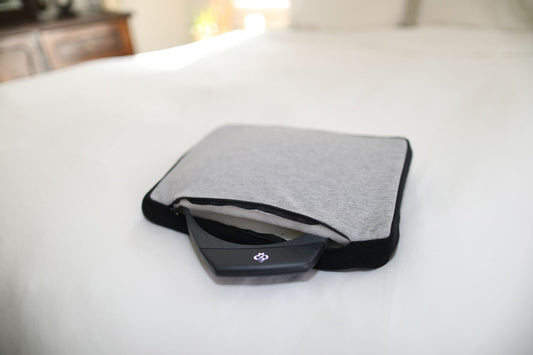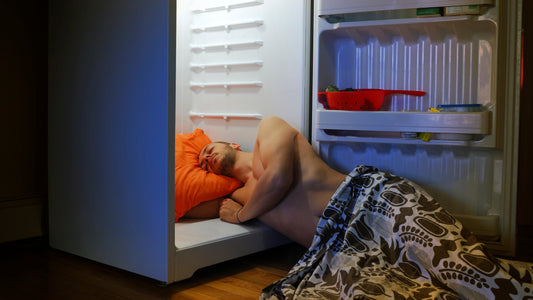Hint: your age could be a factor
Your eyes open yet again and you roll over to look at the clock. 2:53 AM. Why do you keep waking up during the night? It wasn’t always like this.
There are several possible reasons you’re not able to sleep through the night like you used to. Whatever the underlying issue, insomnia is tough to deal with. Not only does it leave you exhausted during the day, but it also has the potential to cause numerous other issues, including:
- Depression and anxiety
- Gastrointestinal problems
- Low energy
- Inability to focus
- Lack of coordination
- Tension headaches
If you’re waking up at night more often than you used to, you might think that your body doesn’t need as much sleep as before. However, experts say adults need 7-9 hours of sleep up to the age of 65 and 7-8 hours above the age of 65. So yes, your sleep needs remain constant.
Is there anything you can do to prevent yourself from waking up at night? First, see if you can determine the main reason you’re not able to stay asleep the whole night. Then, try out some of these tips for how to sleep through the night.
Why do I wake up in the middle of the night?
Waking up in the middle of the night is a problem that lots of people deal with. If this has been happening to you for a while, you might feel anxious when you wake up at night because you feel like you won’t be able to get back to sleep. Of course, this typically becomes a self-fulfilling prophecy when your anxiety about not sleeping prevents you from falling asleep.
What causes this tendency to wake up at night? There are a few possibilities. One of them is your lifestyle. Habits such as eating or drinking alcohol before bed, napping too much, and having a high caffeine intake can all make you wake up in the middle of the night.
Your age could also be a contributing factor. Older adults tend to experience changes in the duration and quality of their sleep. Another cause could be your medication or an underlying medical condition. If you think either of these could be keeping you up at night, it’s wise to consult your doctor.
The role of normal aging in your sleep cycle
Many older adults find their sleep cycle becomes disturbed as they age. The main reason for this is that as you age, your internal body clock typically changes. This affects your circadian rhythm, which is responsible for feelings of sleepiness and alert.
Daylight exposure can greatly improve your circadian rhythms, especially as you age. Unfortunately, many older people do not have as much time outside as they should. Make sure you work daylight exposure into your daily routine so you stay healthy as you age.
Research shows that older adults typically spend more time in the lighter sleep stages that happen early on in the sleep cycle and less time in the important later stages of deep sleep. Because they are so often in the lighter stages of sleep, they wake up often during the night.
Other common age-related sleep disturbances people experience are napping frequently, going to bed early, waking up early, and having a hard time with sleep schedule alterations.
While there’s not much you can do about getting older, there are steps you can take to improve your sleep quality and stop waking up during the night. Hopefully, you’ll be able to consistently get a good night’s sleep soon.
Underlying medical conditions to watch out for
Before we jump into how to sleep through the night, it’s important to consider whether you have an underlying medical condition that could prevent you from sleeping well. The most common ones are sleep apnea, restless leg syndrome, neuropathy, enlarged prostate, and anxiety/depression.
Sleep apnea causes brief awakenings and pauses in breathing throughout the night. You can usually tell if you have sleep apnea by asking your partner if you snore loudly or doing a sleep study. If you think you might have it, see your doctor for treatment.
Restless leg syndrome makes you feel like you have tingling in your legs. It can keep you awake at night because of your constant need to move your legs. Your doctor can help you with medicine and exercises to treat it.
Neuropathy is a painful condition that causes numbness in the hands and/or feet. One of the most common causes of neuropathy is diabetes. The pain that results from neuropathy could wake you up in the middle of the night.
Having an enlarged prostate typically means you have to urinate frequently. This wakes you up often during the night. There are several practices you can adopt to relieve the symptoms of having an enlarged prostate.
Dealing with anxiety and/or depression can significantly affect your sleep. These mental health issues can keep you from falling asleep at night and stop you from getting back to sleep if you wake up in the middle of the night. See your doctor for a mental health treatment plan.
Any of these underlying medical conditions can severely affect your ability to sleep through the night. Don’t wait to receive treatment advice. Your sleep could improve significantly with the right treatment.
How to sleep through the night
Regardless of the reason you’re not able to stay asleep all night, there are some things you can try that might help. Here are 11 tips to help you sleep through the night.
1. Get on a schedule
Keeping an erratic sleep schedule is one of the worst things for your body. Because of your circadian rhythm, it’s important to go to sleep at roughly the same time every night and wake up at the same time as well. Incorporate a calming routine before bed that gets your body ready for sleep. This can include drinking herbal tea, taking a shower, or practicing meditation.
2. Invest in the right mattress and pillow
Too many people continue using an uncomfortable mattress and pillow because they don’t want to spend the extra money. If you constantly wake up in the middle of the night, an investment in the right mattress and pillow is a necessary investment in your overall health. You don’t have to buy a luxury mattress to sleep comfortably. Look for one that meets your needs at an affordable cost.
3. Watch what you drink
I know it’s hard to hear, but caffeine and alcohol can both prevent you from staying asleep all night. It’s best to stop drinking caffeine and alcohol several hours before your designated bedtime. Consider drinking a cup of herbal tea or a glass of tart cherry juice instead.
4. Limit naps
Did you know that your body releases melatonin at around 2:00 PM? This is the ideal time to take a 15- to 30-minute nap. If you sleep longer or later than that, your nighttime sleep could be affected. Of course, it can be difficult to stay awake all day if you’ve been sleeping poorly. Energize yourself by taking a quick nap and then use a nap app to wake you up at the proper time so you can sleep well at night.
5. Don’t go to bed until you’re sleepy
It’s good to have a sleep schedule, but don’t be too strict about it. If you’re wide awake at bedtime, going to bed might just make you anxious about not being able to fall asleep. Instead of getting into bed, spend a few minutes doing a relaxing activity such as reading. Once you start to feel sleepy, get into bed.
6. Move your clock
It may seem necessary to have a clock by your bedside, but it can actually cause stress if you wake up at night. Checking the time in the middle of the night can make you anxious about being awake, which will probably prevent you from falling back asleep. Move your clock out of sight to avoid this problem.
7. Avoid your phone before bed
Too much blue light exposure at night can mess with your natural melatonin levels and keep you from sleeping well. It’s best to keep your phone in another room at night so that you’re not tempted to check your email one last time before you sleep. Limit your evening TV and computer use as well. You’ll sleep much better if you give yourself a lengthy break from all those devices before bed.
8. Exercise regularly
According to research, adults who exercise regularly fall asleep in half the amount of time it takes those who don’t exercise regularly. Regular exercisers also sleep about 40 minutes longer than other adults. Making an effort to exercise every day can greatly improve your sleep, but make sure you avoid working out right before bed so that the adrenaline doesn’t keep you up.
9. Try cognitive behavioral therapy for insomnia
If you’re really struggling to fall asleep or stay asleep all night, you could benefit from cognitive behavioral therapy for insomnia (CBT-I). This treatment plan involves working with a professional to identify feelings, thoughts, and behaviors that are contributing to your insomnia. CBT-I has been found to be more effective than medications for some patients. You can look for a CBT-I provider in your area.
10. Know when it’s time to get out of bed
One common mistake when you wake up in the middle of the night is to lie awake in bed for hours, worrying about the sleep you’re missing. Instead, get out of bed if you don’t fall back asleep within about 20 minutes of waking up. Do a relaxing activity such as reading until you start to feel sleepy again. You’ll be able to find sleep much faster if you’re not anxious about it.
11. Use the Hapbee Deep Sleep signal
Did you know that there’s a Hapbee signal created especially to help you sleep through the night? It’s called Deep Sleep. What we recommend is working the Bedtime signal into your nightly routine by turning it on about an hour before you’re ready for bed. Once you get into bed, switch to the Deep Sleep signal and put the Hapbee device underneath your pillow. You’ll be much less likely to wake up in the middle of the night.
Hapbee is a wearable device that lets you choose how you feel, no substances required. With our 30-day money-back guarantee, you have nothing to lose. Try Hapbee today. We’d love to hear how the Deep Sleep signal helps you sleep better at night.
The post Here’s Why You’re Not Able to Sleep Through the Night appeared first on Hapbee - Choose How You Feel.










